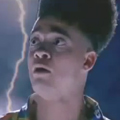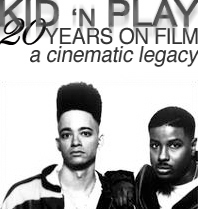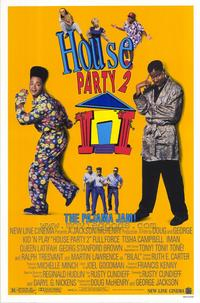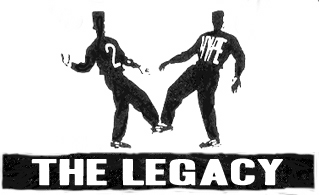
 HOUSE PARTY 2 has that typical sequel problem: holy shit, the first time we were just doing what we wanted to do, now we gotta live up to people’s expectations. So in the beginning they kinda redo the beginning of the first one. It’s another fog machined dream of people dancing, but this time they got recent Academy Award winner Whoopi Goldberg to do a cameo as an evil professor. And there’s lightning and stuff. Spooky.
HOUSE PARTY 2 has that typical sequel problem: holy shit, the first time we were just doing what we wanted to do, now we gotta live up to people’s expectations. So in the beginning they kinda redo the beginning of the first one. It’s another fog machined dream of people dancing, but this time they got recent Academy Award winner Whoopi Goldberg to do a cameo as an evil professor. And there’s lightning and stuff. Spooky.
They also had a less typical sequel problem: holy shit, the best part of part 1 died right after it came out. So they dedicate the movie to Robin Harris, have Kid say a little prayer to Pop, have photos of him around that sometimes come to life in brief clips from part 1. At the very beginning of the movie Kid says, “About that party – you were right to whoop my ass,” referring to the beating he was about to get as the credits rolled. Weird that that’s what his mind jumps to when he remembers his dad. Only way I can explain it is either Kid knows he’s in a movie about that house party, or Pop died while administering that beating.
 To the movie’s credit it does advance the story and the characters. It starts on Kid’s first day of college. He’s now steady with Sidney (still Tisha Campbell) and they’re both going to college. Play is staying behind, managing a record store, and trying to convince Kid not to go so they can pursue a record contract. But also he’s using his beloved car “Forplay” to help Kid move into a dorm, much as he helped Bilal bring his DJ equipment to the party. Continuity, you see. He’s the guy with the car.
To the movie’s credit it does advance the story and the characters. It starts on Kid’s first day of college. He’s now steady with Sidney (still Tisha Campbell) and they’re both going to college. Play is staying behind, managing a record store, and trying to convince Kid not to go so they can pursue a record contract. But also he’s using his beloved car “Forplay” to help Kid move into a dorm, much as he helped Bilal bring his DJ equipment to the party. Continuity, you see. He’s the guy with the car.
Also I think Kid’s fade has matured by maybe 2 inches in height and definitely increased in girth.
Kid is able to go to college because of a scholarship fund set up by his church. They’re all counting on him to make his dead parents proud, and they give him a leather portfolio with his “scholarship check” which instead of depositing in a bank he is bringing to the school. But he forgets it in the trunk of Forplay, and then Play stupidly hands it over to the scam artist he thinks is gonna sign him for a solo album (Iman). I feel that this is not an accurate depiction of how money can be exchanged.
But that’s the conflict here, he needs money or he’s gonna get kicked out of school, so he gets into a work-study program where he works in a kitchen (he has to wear a little plastic hairnet on top of his fade, ha ha). But Play feels bad so him and Bilal show up at the school to organize a huge clandestine dance party. Since it will take place in a school building it’s not technically a house party, but they distract us from this fact by making it a “Pajama Jammie Jam.” This is supposed to be awesome because it means there will be women in negligees, and the plan seems to work. I didn’t see anybody in one of those long ass Garfield nightshirts or anything like that. Unfortunately the use of pajamas does take away opportunities for ridiculous clothes that were considered cool at the time.
To make up for it the record store is a very good snapshot of what music was out at the time. There’s a big wall showing album covers for MC Hammer, Eric B & Rakim, ABC, the New Jack City soundtrack and a couple other things. Inside there’s alot of advertising for Son of Bazerk and Johnny Gill.
By the way, Stab, Pee-Wee and Zilla are back. Their mom tries to get them a job at the record store, then they become campus security officers instead, so they’re able to continue harassing Kid ‘n Play. In my opinion this is kind of stretching credibility, like when Bobcat Goldthwait became a good guy in the POLICE ACADEMYs or Ogre in the REVENGE OF THE NERDSes.
Here’s how you know this movie came out in 1991: Queen Latifah, wearing those Cleopatra-inspired clothes and hats she used to wear back then, plays Sidney’s roommate Zora, who preaches Afrocentrism, makes her feel bad about having a boyfriend and guilts her into taking feminist studies. Zora proudly refers to herself as “politically correct,” which is a misunderstanding of how anybody ever used that phrase. But despite her unfair interference in Sid ‘n Kid’s relationship she’s portrayed as a respectable person, and there are other politically active characters in the movie such as Kid’s teacher Professor Sinclair (Georg Stanford Brown, who was in BULLITT). Also when it goes into the musical numbers later on Kid is rapping about education and enlightenment and shit. Even Play, who’s supposed to be kinda ignorant, wears a red black and green shirt. Afrocentrism was considered cool back then. I mean, this is HOUSE PARTY 2, but it ends with a James Baldwin quote, and Dr. Betty Shabazz is thanked on the credits. (Okay, probly just because she gave permission to use Malcolm X’s image. But still. I doubt she was thanked on BIG MOMMA’S HOUSE 2.)
This is not what I would consider a good movie, but I do think it’s genuinely interesting as a time capsule. It says alot about the differences between pop culture of 20 years ago and now, especially when it comes to hip hop and images of black Americans. I’m not saying there aren’t positive images of black people in modern movies, or attempts to encourage education or enlightenment. But it’s hard to imagine a movie like this being made now: a mainstream teen comedy sequel where the kid goes to college and wants to learn about Malcolm X and excitedly and unironically says to his girlfriend, “Just imagine it – you and I exploring the roots of blackness together.”
I never was a fan of Kid ‘n Play’s music, and I don’t think it holds up particularly well. (Although better than some.) So I’m not saying these are good songs, and the lyrics are definitely simplistic and corny. But I think it’s interesting how popular it was back then to try to “drop science” and use lyrics to glorify education and political activism. Today’s mainstream rappers, at least the ones from the East Coast like Jay-Z and Kanye West, have lyrics that I think are much more sophisticated both in structure and content than what rappers were doing back then for the most part. But I think way, way more often than not they’re talking about materialism and being awesome, and not really getting across the idea that they’re cool because they’re intelligent.
On the other hand I could make an argument for Jay-Z “dropping science” in the same exact way that Public Enemy did. In PE’s lyrics you would hear them talking about Joanne Chesimard or somebody, you would eventually get curious what they were talking about and go to the library and look it up (this was before the internet – if you don’t know what a library is, look it up on the internet). Jay-Z did the same thing for me in the song “Say Hello to the Bad Guy” on his underrated American Gangster album. He has a line where he says, “When Jena 6 don’t exist tell them that’s when I’ll stop sayin ‘bitch,’ bitch.” And I didn’t know what that meant until somebody explained it to me. Or I could’ve looked it up at a library or wikipedia.
So I appreciate that, but I do think it’s different because when people looked up to Public Enemy they thought Man, I want to be strong and defiant and know my shit and create the greatest music ever like those guys, but I think when alot of people look up to Jay-Z they’re sometimes thinking about his lyricism and more often about his money and business, being a CEO and wearing expensive clothes and having “the flyest girl in the game wearing my chain” and all that. They would show up to see Jay-Z but I’m not sure how they would feel about marching behind him with signs like in the “Fight the Power” video. I can’t picture that happening today.
But everybody would’ve done it in the days of HOUSE PARTY 2. When Kid first arrives at his dorm he sees a Malcolm X poster on the wall, and a bunch of Black Panther paraphernalia and stuff, and then his roommate Jamal turns around and he’s a white guy (played by Kamron from the never-did-catch-on rap group Young Black Teenagers). In 2010 if you have a white guy (or a robot) who “wants to be black,” that means he’s wearing sports jerseys and jewelry, carrying guns, using stupid slang, maybe wearing gold teeth. He’s not wearing an Africa medallion or trying to be part of the Black Power movement.
Also Jamal is really into bean pies. There were alot of Muslim/bean pie jokes back then. What the fuck is a bean pie? Are they good?
Anyway, like I was saying, things are different now. And yeah, we have a black president, but he grew up during times when there were popular black political movements. I’ve said it before, but he and Michelle’s first date was to see DO THE RIGHT THING. They came of age in a post-Fight the Power, pre-Flavor of Love world.
It was the times that made it possible, but I think credit for the content of HOUSE PARTY 2 probly also goes to co-writer Rusty Cundieff. He’s the guy who wrote and directed FEAR OF A BLACK HAT and TALES FROM THE HOOD. He was also a correspondent on Michael Moore’s show TV Nation. As an actor he appeared in HOLLYWOOD SHUFFLE and SCHOOL DAZE. (His script for HOUSE PARTY 2 was re-written by Daryl G. Nickens, a mostly-TV writer from Benson, Webster, A Different World and 227.)
Since it’s part 2 there had to be two directors. Really, how is one man gonna truly understand what it’s like to be 2 hype? No, you gotta have a team. George Jackson and Doug McHenry had produced KRUSH GROOVE, DISORDERLIES, NEW JACK CITY and of course STALINGRAD, but they’d never directed before this. And I’m surprised either of them bothered to direct again after this, because what more is there to say? They got African studies, they got pajamas, this movie covers it all.

http://youtu.be/CPFckzxs1sw


























December 14th, 2010 at 1:27 am
I liked TALES FROM THE HOOD. Best episode probably had to be the Rodney King-influenced corrupt cops segment. Good shit.